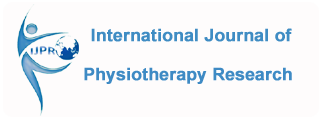IJPR.2018.166
Type of Article: Review
Volume 6; Issue 5 (October 2018)
Page No.: 2864-2881
DOI: https://dx.doi.org/10.16965/ijpr.2018.166
EVIDENCE BASED REVIEW OF PHYSIOTHERAPY MANAGEMENT OF CEREBRAL PALSY PATIENTS
Raj Sharma *1, Jyoti Sharma 2, Vikas Bharadwaj 3.
*1 Assistant Professor, Noida International University, Greater Noida, India.
2 Assistant Professor, Amar Jyoti Institute of Physiotherapy, Karkardooma, India.
3 Assistant Professor, School of Medical Sciences and Research, Sharda University, India.
Corresponding Author: Dr. Raj Sharma, Assistant Professor, Noida International University, Greater Noida, India. E-Mail: xyjyoti11@gmail.com
ABSTRACT
Cerebral palsy (CP) is a common neuro developmental condition encountered by pediatricians. The condition may present itself in many different clinical spectra. The etiological and risk factors are many and an awareness of the interplay of multiple factors in the causation of CP is crucial. In many cases, the cause of Cerebral palsy may not be apparent. Cerebral palsy is invariably associated with many deficits such as mental retardation, speech and language and oromotor problems. A thorough neuro developmental assessment of the child with Cerebral Palsy should include evaluation of associated deficits so that a comprehensive early intervention program can be planned and executed. Hence, this review is carried out to assess the benefit of physiotherapy management of cerebral palsy patients.
Key words: Cerebral Palsy, Physiotherapy management, Mental retardation.
REFERENCES
- Singhi PD, Ray M, Suri G. Clinical spectrum of cerebral palsy in north India an analysis of 1000 cases. J Trop Pediaty 2002; 48: 162-166.
- Molnar GE. A developmental perspective for the rehabilitation of children with physical Pediatric Ann 1988; 17: 766-776.
- Palisano RJ, Chiarello LA, Orlin M, Oeffinger D, Polansky M, Maggs J, Bagley A, Gorton G. Determinants of intensity of participation in leisure and recreational activities by children with cerebral palsy. Developmental Medicine and Child Neurology 2010; 53: 142-149.
- Hoare BJ, Imms C, Carey L, Wasiak J. Constraint-induced movement therapy in the treatment of the upper limb in children with cerebral palsy: a Cochrane systematic review. Clinical Rehabilitation 2007; 21: 675-685.
- Mac lennan A. A temaplate for defining a casual relation between acute intarpatum events and cerebral interanational consensus statement. BMJ 1999; 319: 1054-1059.
- Boyd RN, Morris ME, Graham HK. Management of upper limb dysfunction in children with cerebral palsy: a systematic review. European J Neurology 2001; 8(Suppl 5): 150-166.
- Palisano RJ, Rosenbaum PL, Walter S, et al. Developmental and reliability of a system to classify gross motor function in child with cerebral Dev Med Child Neurol 1997; 39: 214-223.
- Rosen MG, Dickinson JC. The incidence of cerebral palsy. AM J obstest Gynecol 1992; 167: 417-423.
- Nelson KB. Can we prevent cerebral palsy?. N eugl J med 2003; 349: 179.
- Kuban KCK, Levilon A. Cerebral palsy. N Eng L J MED 1994; 33: 188-195.
- Martin, Kessler: Neurological interventions for physical therapy 2nd edition: 124-126.
- Thelan E, Treadmill stepping in seven month old infants Dev 1986; 57: 1498-1506.
- Menkes JH, Sarnat HB. Periutal asphyxia and trauma. In menkesjh, Sarnat HB, edn. Child neurology. Lppinoh Williams and Wilkins 2000; 427-436.
- Wu YW, Colford JMJR. Choioamnionitis as a risk factor for cerebral palsy. A meta analysis JAMA 2000; 284: 1417-1424.
- Walt JM, Robertson CMT, Grace MGA. Early prognosis for ambulation of neonatal intensive care survivors with cerebral Dev Med Child Neurol 1989; 31: 766-773.
- Boyd RN, Morris ME, Graham HK. Management of upper limb dysfunction in children with cerebral palsy: a systematic review. European J Neurology 2001; 8(Suppl 5): 150-166.
- Blackmore AM, Boettcher-Hunt E, Jordan M, Chan MDY. A systematic review of the effects of casting in children with cerebral palsy: an evidence report of the AACPDM. Dev Med Child Neurol 2007; 49: 781-790.
- Hoare BJ, Imms C, Carey L, Wasiak J. Constraint-induced movement therapy in the treatment of the upper limb in children with cerebral palsy: a Cochrane systematic review. Clinical Rehabilitation 2007; 21: 675-685.
- Kerr C, McDowell B, McDonough S. Electrical stimulation in cerebral palsy: a review of effects on strength and motor function. Dev Med Child Neurol 2004; 46: 205-213.
- Ashwal S, Russman BS, Blasco PA, et al. Diagnostic assessment of the child with cerebral palsy: Report of the quality standards subcommittee of the American academy of neurology and the practice committee of the child neurology
- Stanger M. Rehabilitation approach for children with cerebral palsy: overview. J Child Neurol 2003; 18: 579-588.
- Willis JK, Maillo A, Riujl A. et al. Forced use treatment of childhood Pediatric 2002; 110: 94-96.
- Alpert BS, Flood NL, Strong WB, Dover EV, DuRant RH, Martin AM, Booker DL. Responses to ergometer exercise in a healthy biracial population of children. J Pediatrics 1982; 101: 538-545.
- Mockford M, Caulton JM. Systematic review of progressive strength training in children and adolescents with cerebral palsy who are ambulatory. Pediatric Physical Therapy 2008; 20: 318-333.
- Palisano RJ, Chiarello LA, Orlin M, Oeffinger D, Polansky M, Maggs J, Bagley A, Gorton G. Determinants of intensity of participation in leisure and recreational activities by children with cerebral palsy. Dev Med Child Neurol 2010; 53: 142-149.
- Clanchy KM, Tweedy SM, Boyd RN, Trost SG. Validity of accelerometry in ambulatory children and adolescents with cerebral palsy. European J Applied Physiology 2011; 12: 2951-2959.
- Dood KJ. Systemic review of the effectiveness of strength training program for people with cerebral Pediatric Neurol 2004; 11: 60-77.
- Ade-Hall RA, Moore AP. Botulinum toxin type A in the treatment of lower limb spasticity in cerebral palsy. Cochrane Database of Systematic Reviews 2000; 2: CD001408.
- Thompson G, Hrubin K, Bilenker RM. Comprehensive management of cerebral palsy New York. Grune and Stratton. 1983 and Scherzer A. tscharnuter: early diagnosis and therapy in cerebral palsy. AMJ Dis child 1989; 143: 552-555.
- Vargos SC, Amilli G. A meta analysis of Research on Sensory Integritive treatment Amjoccr 1999; 53: 189-198.








